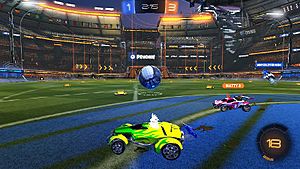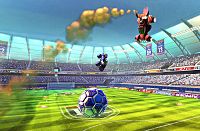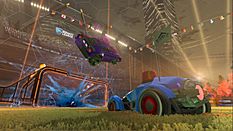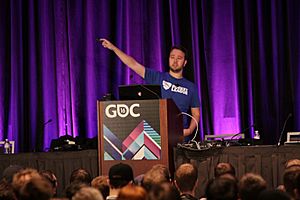Rocket League facts for kids
Quick facts for kids Rocket League |
|
|---|---|
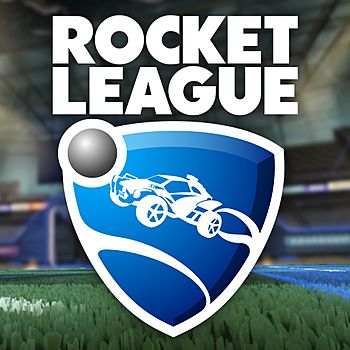 |
|
| Developer(s) | Psyonix |
| Publisher(s) | Psyonix |
| Director(s) | Thomas Silloway |
| Producer(s) | Sarah Hebbler |
| Designer(s) | Corey Davis |
| Programmer(s) | Jared Cone |
| Artist(s) | Bobby McCoin |
| Composer(s) | Mike Ault |
| Engine | Unreal Engine 3 |
| Platform(s) | |
| Release date(s) |
July 7, 2015
|
| Genre(s) | Sports |
| Mode(s) | Single-player, multiplayer |
Rocket League is a vehicular soccer video game developed and published by Psyonix. The game was first released for Windows and PlayStation 4 in July 2015, with ports for Xbox One and Nintendo Switch being released later on. In June 2016, 505 Games began distributing a physical retail version for PlayStation 4 and Xbox One, with Warner Bros. Interactive Entertainment taking over those duties by the end of 2017. Versions for macOS and Linux were also released in 2016, but support for their online services were dropped in 2020. The game went free-to-play in September 2020.
Described as "soccer, but with rocket-powered cars", Rocket League has up to eight players assigned to each of the two teams, using rocket-powered vehicles to hit a ball into their opponent's goal and score points over the course of a match. The game includes single-player and multiplayer modes that can be played both locally and online, including cross-platform play between all versions. Later updates for the game enabled the ability to modify core rules and added new game modes, including ones based on ice hockey and basketball.
Rocket League is a sequel to Psyonix's Supersonic Acrobatic Rocket-Powered Battle-Cars, a 2008 video game for the PlayStation 3. Battle-Cars received mixed reviews and was not a success, but gained a loyal fan base. Psyonix continued to support themselves through contract development work for other studios while looking to develop a sequel. Psyonix began formal development of Rocket League around 2013, refining the gameplay from Battle-Cars to address criticism and fan input. Psyonix also recognized their lack of marketing from Battle-Cars and engaged in both social media and promotions to market the game, including offering the game for free for PlayStation Plus members on release.
Rocket League was praised for its gameplay improvements over Supersonic Acrobatic Rocket Powered Battle-Cars, as well as its graphics and overall presentation, although some criticism was directed towards the game's physics engine. The game earned many industry awards and saw over 10 million sales and 40 million players by the beginning of 2018. Rocket League has also been adopted as an esport, with professional players participating through ESL and Major League Gaming along with Psyonix's own Rocket League Championship Series (RLCS).
Contents
Gameplay
Rocket League's gameplay is largely the same as that of its predecessor, Supersonic Acrobatic Rocket-Powered Battle-Cars. Players control a rocket-powered car and use it to hit a ball that is much larger than the cars towards the other team's goal area to score goals, in a way that resembles indoor soccer, with elements reminiscent of a demolition derby. Players' cars have the ability to jump to hit the ball while in mid-air. The players can also pick up a speed boost by passing their cars over marked spaces on the field, enabling them to quickly cross the field, use the added momentum to hit the ball, or ram into another player's car to destroy it; in the latter case, the destroyed car respawns moments later on their team's side of the field. A player may also use a boost when in the air to propel themselves forward in flight, allowing players to hit the ball in the air. Players can alter their car's orientation while midair, which combined with midair boosting allows for controlled flight. Players can also perform quick dodges, causing their car to do a short jump and spin in a given direction, which can be used to nudge the ball or gain positioning advantage over the other team.
Matches are usually five minutes long, with a sudden death overtime if the game is tied at that point. Matches can be played from between one-on-one up to four-on-four players, as well as in casual and ranked playlists. The latter serves as Rocket League's competitive online mode, where players compete in various tiered ranks within game seasons, with victories or losses raising or lowering a player's rank, respectively. The game includes a single-player Season mode, with the player competing with computer-controlled players. An update in December 2016 introduced Custom Training sequences that can be created by players and shared with others on the same platform; players are able to specify the ball's path and the presence and skill of opponents on the field as to practice specific shots-on-goal over and over.
A few months after it was released, Psyonix released an update that added game modes known as mutators, modifying some aspects of gameplay, such as increased or decreased gravity, ball size, ball speed and bounciness. For the 2015 holiday season, another update replaced mutator matches with an ice hockey-inspired mode (called Snow Day), played on an ice rink and the ball replaced with a hockey puck with different physics. Positive reception to the ice hockey mode led to it being extended for a few weeks after the holiday season. Snow Day was permanently added to the mutator settings for private matches and exhibition games on February 10, 2016. Hoops, a game mode based on basketball, was added on April 25, 2016. A separate Rumble mode, which incorporates unusual power-ups, such as the ability to freeze the ball in place or cause a single opponent to have difficulty controlling their car, was added on September 8, 2016. An update in December 2016, known as Starbase ARC and based on Psyonix' mobile game ARC Squadron, added support for custom arenas for Windows players supported through Steam Workshop, along with other new content. In celebration of Super Bowl LV in February 2021, Psyonix released a limited time gamemode called Gridiron, which functions similar to gridiron football with the normal soccer ball being replaced by a football.
A new game mode, Dropshot, was added in a March 2017 update. It takes place in an arena without any goals and a field made of hexagonal tiles, and uses a ball that becomes increasingly electrified after successful strikes or passes. The more the ball is struck by players without touching the ground the more electrified it becomes, and the more tiles it damages once it finally does hit the ground. The goal of the mode is to damage the opponent's floor enough to break a hole into it, allowing the ball to drop through and score. When a team scores, the floor on the opponent's side of the field resets to normal, while the floor on the scoring team's side retains any existing damage.
As part of a means to monetize the game beyond downloadable content, Psyonix has tried a few different approaches. In September 2016, it introduced a loot box system known as Crates, where players could purchase them with a random selection of in-game customization items, opened through the purchase of Keys using real-world funds. Due to increasing governmental concern over loot boxes, Psyonix replaced the Crates system with Blueprints in December 2019, which offer a known specific item with potential modifiers as potential end-of-match drops. These Blueprints can then be crafted using the game's new premium currency (Credits), or purchased with real-world funds, if the player so chooses. A new rotating Item Shop was introduced in December 2019 as well, with Featured items available on a 48-hour timer and Daily items on a 24-hour timer. The Item Shop includes all types of in-game items, such as Painted Cars, Exotic Wheels, Goal Explosions, and many more. Each item has a listed Credit value that will show the item's cost, allowing players to purchase the exact item they want, instead of relying on RNG to attain a specific item previously available through loot boxes. Separately, Psyonix added a battle pass feature to the game in September 2018, known as the Rocket Pass. Each pass, which lasts a few months, has challenges and other opportunities through playing Rocket League that allow players to increase the tier of the Pass, from which new unique customization options tied to that pass can be unlocked. While the Rocket Pass is free to all players, a flat-cost premium option that accelerates the level up rate and unlocks additional items at certain tier levels can be purchased.
Its mobile game version, Rocket League Sideswipe, plays almost the same, except the game is now in 2D instead of 3D.
Development
Psyonix had previously developed Supersonic Acrobatic Rocket-Powered Battle-Cars in 2008 for the PlayStation 3. That game itself bore out from previous modifications that Psyonix' founder, Dave Hagewood, had done for Unreal Tournament 2003 by expanding out vehicle-based gameplay that Epic Games had already set in place in the engine into a new game mode called Onslaught. For this, Hagewood was hired as a contractor by Epic for Unreal Tournament 2004 specifically for incorporating the Onslaught mode as an official part of the game. Hagewood used his experience at Epic to found Psyonix. Among other contract projects, Psyonix worked to try to find a way to make racing the Unreal vehicles in a physics-based engine enjoyable. They had toyed with several options such as race modes or mazes, but found that when they added a ball to the arena to be pushed by the vehicles, they had hit upon the right formula, which would become Battle-Cars. Further to the success was the addition of the rocket-powered cars; this originally was to be a simple speed boost, but with the physics engine, they were able to have the vehicles fly off and around the arena, furthering the possibilities for gameplay.
As Psyonix finished development of Battle-Cars, the studio had tried to gain access to a publisher by selling their game as "soccer, but with rocket-powered cars"; none of the publishers seemed interested. Ultimately, they opted to self-publish the game on the PlayStation Network with almost no marketing. Though it was downloaded more than two million times, it was not considered very successful even after the studio cut the price. The studio continued on to other projects, though kept the idea of building on Battle-Cars as an option, recognizing the game had a small but dedicated fan-base that provided them with ideas for expansion. These other projects, which including contract work for AAA games, including Mass Effect 3 and Gears of War, helped to fund the development of Rocket League.
Full development of Rocket League started around 2013 and took around two years and under $2 million to develop, though they had tested various prototypes of a Battle-Cars sequel in the years prior, including an unsuccessful attempt at pitching the game's idea to Electronic Arts in 2011. Psyonix used some of the feedback from Battle-Cars to fine-tune the gameplay in Rocket League. A key requirement for Psyonix was to increase the game's frame rate from 30 to 60 frames-per-second, a known criticism from Battle-Cars and essential for newer hardware, according to Corey Davis, the design director at Psyonix. Hagewood recognized that Battle-Cars was considered "too hardcore" with the game becoming too inaccessible to novice players against skilled ones. They eased up on some aspects to make it more approachable, such as by slowing the pace of the game and allowing players of all skill levels to reasonably compete against each other while promoting team-based gameplay. Though they tried to add elements like power-ups, they found these to be too distracting to gameplay. They also explored other changes such as making the game more gritty, akin to Monday Night Combat, developing several mini-games related to handling of the car, working on making the graphics give a sense of scale to the players to give the impression they were controlling full-sized vehicles rather than radio-controlled cars, and creating an open world structure where the player would drive between stadium and stadium to participate in matches. Instead, the team opted to strip the game to its core, focusing on more visual elements to enhance the title. From Battle-Cars, Psyonix recognized very few players actually went online, and developed Rocket League's single-player season mode to encourage players to try online matches once they completed it.
Psyonix's team were aware of past difficulties that they had with Battle-Cars and other racing games with online play and client-side prediction, and the issues that would arise from that with Rocket League's fast-paced play style. To solve this, the physics in the game are based on using the Bullet physics engine within the Unreal Engine 3's PhysX engine, which tracks the movement of all the cars and actors, allowing them to periodically re-synchronize the game state across players based on the stored physics states, which enabled players to have quick reactions from their client. At the time of Battle-Cars, Psyonix could not afford a dedicated server network and were forced to rely on individual hosts, which could lead to poor performance with slow Internet connections. With Rocket League, Psyonix was able to put a dedicated server network in place, writing their own service protocols to interface with Sony's and Valve's online services so as to enable cross-platform play, as well as improving matchmaking capabilities. Psyonix's previous experience in contract work for AAA games had exposed them to the larger developers' approach to release and quality control, and they were able to apply those principles and aim for the same level of quality requirements in the final release of Rocket League.
Psyonix had at one point considered having Rocket League as a free-to-play game with microtransactions, inspired by Team Fortress 2 and Dota 2's models. Though they had put in efforts to establish a free-to-play model, Psyonix decided instead to switch to a traditional sale method, and offer only cosmetic elements as downloadable content, assuring that no players would have any additional advantage beyond their own skill. The name Rocket League was selected in part to reduce the size of the game's title in order to appear fully in digital storefronts, and also served to be an easier to remember name as well as a more mature-sounding title than Battle-Cars, according to Hagewood; speaking on Rocket League's development in March 2016, Davis opined that Supersonic Acrobatic Rocket-Powered Battle-Cars was "the worst game name of all time".
In April 2021, company announced that they would release Rocket League Sideswipe for iOS and Android.
Cross-platform play
Rocket League has been one of the leading games in supporting cross-platform play between personal computers and consoles. Jeremy Dunham, Psyonix's vice president of publishing, says cross-platform play helps establish a stable player base and avoid the snowball effect that can cause isolated player bases on individual platforms to wane, particularly in the transition from one console generation to the next. Though the Xbox One version lacked this feature at launch, Microsoft in March 2016 announced that Rocket League would be the first game in a new initiative they were taking to enable cross-play between Xbox One and Windows players who have Xbox Live accounts; this cross-platform play feature was added in an update in May 2016. Microsoft has stated that they offer other networks, such as Sony's PlayStation Network, the ability to integrate with Xbox Live to allow full cross-platform compatibility for games like Rocket League. Dunham noted that this cross-platform idea had been something they asked Microsoft about when Rocket League was set for an Xbox One release, but he stated that Microsoft did not seem to be on board with it. Only after they had neared the release date would Microsoft take the initiative to offer it as one for their new cross-play efforts and started working towards this possibility in the game.
Psyonix determined the required technical steps needed to enable cross-platform play and have tested it in closed environments, and were only waiting for the legalities of cross-connecting players between different networks before proceeding. this work also includes how they would be able to distribute updated content patches in a unified and more frequent manner to enable them to continue to expand the game for at least another 9 months. In a July 2016 interview with IGN, Dunham stated they had done all the technical work and could enable cross-platform play between the Xbox One and PlayStation 4 versions "within a few hours" of Sony's approval. As of March 2017, the company is ready to enable this feature, but was still waiting for the console manufacturers to come to the required agreements to allow it.
With the announcement of the Switch version, Psyonix affirmed that it would support cross-platform play with PC and Xbox users. Sony still opted not to participate in this; PlayStation global marketing head Jim Ryan said that while they are "open to conversations with any developer or publisher who wants to talk about it", their decision was "a commercial discussion between ourselves and other stakeholders". Dunham says that in contrast to Microsoft or Nintendo, who agreed to allow cross-platform play within a month and with the day of Psyonix' request, respectively, Sony has been asked on a nearly daily basis about this support and have yet to receive any definitive answer. The cross-platform party feature is planned for an update in early 2019. This will allow players to create in-game friend lists across platforms and play in matches with them. This is limited by the current cross-platform limitations: while Windows players can add friends from other Windows users and Xbox One, PlayStation 4, and Switch users, PlayStation 4 users are limited to Windows and PlayStation 4 users.
In September 2018, Sony had altered its position on cross-platform play following the release of Fortnite Battle Royale for the Nintendo Switch, where the lack of cross-platform play had been a point of significant criticism. Sony allowed Fortnite to be cross-platform play compatible with all platforms and stated they would review other games on a case-by-case basis. By January 2019, Psyonix announced that Sony had granted the same for Rocket League, allowing cross-platform play between the PlayStation 4, Xbox One, Switch, and PC versions in February 2019.
Downloadable content
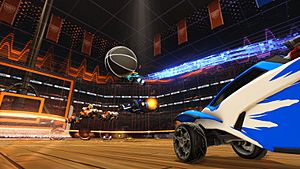
Psyonix planned to continue to support Rocket League with downloadable content (DLC), intending to keep all gameplay updates free and only charging for cosmetic items. In November 2015, a free update added the ability to Mutate a match, allowing for a number of different custom presets and match settings, including a low gravity mode and a cubed ball, among other improvements and additions. Through this, Psyonix is able to offer custom game playlists to test out new modes or for holiday-themed events. For example, during the latter part of December 2015, Psyonix introduced an ice hockey-based mutation alongside a special event featuring holiday-themed decorative items, replacing the normal ball with a hockey puck, and changing the floor to ice. This mode proved very popular and was permanently added to the standard playlists on February 24, 2016. In February 2016, a new game playlist called Rocket Labs was added to offer new experimental maps to players as a means to gauge feedback and interest in a map before adding it to the game's standard map playlist. In April 2016, the developers added the basketball-based playlist to the standard playlists. A new Rumble mode, which adds unique power-ups on various maps, was released in September 2016.
The game's first DLC pack, titled Supersonic Fury, was released in August 2015, along with new arena Utopia Coliseum. It contains exclusive cosmetics, including two new cars, rocket boosts, wheels, five paint finishes, and twelve decals for both new cars. The same month, it was announced that Rocket League would be ported to macOS and Linux later that year, in order to run natively with SteamOS hardware; Rocket League and Portal 2 were part of incentives for those that pre-ordered a Steam Link, a Steam Controller, or a Steam Machine. The game's second DLC pack, titled Revenge of the Battle-Cars, was released in October 2015. The DLC adds two more cars from Supersonic Acrobatic Rocket-Powered Battle-Cars, along with exclusive cosmetics for both. In another event, players had a chance to collect six Halloween-themed items from October 18 to November 2. The game's third DLC pack, titled Chaos Run, was released in December 2015. The DLC added two more cars, along with more cosmetics. A new arena, called "Wasteland", was released for free alongside the DLC. The map is notable for being the first non-standard arena to be released, having a different size and shape than the others and inspired by the Mad Max films, the first of which Psyonix plans to release over time.
In June 2016, a new arena, Neo Tokyo, based on the Rocket Labs layout Underpass, was added to the game via an update. The update also introduced cosmetic items awarded at the end of matches with various rarity grades, and gave players the ability to trade multiple items of the same type and rarity grade to obtain an item of a better rarity grade. Also included in the patch are a number of painted and certified items, the latter of which are cosmetic items with statistics-recording tags, and eight new achievements. Psyonix added the ability for players to trade items with other players within the "Rumble" update, including item and crate drop systems comparable to Team Fortress 2 and Counter-Strike: Global Offensive, in which players have the chance to gain locked crates from playing in competitive matches. Players are able to purchase keys to open these crates through microtransactions, revealing special decorative items for their cars. Players can opt-out of this feature to disable crate drops. Though items received in crates are tradable within the game, these items cannot be sold on the platform's respective marketplaces so as to prevent issues in the same vein as the Counter-Strike skin gambling controversy. The funds from microtransactions would be used to support the esports tournaments organized by Psyonix. In October 2016, a major update titled "Aquadome" launched, featuring a new arena placed under the sea, along with two new premium water-themed cars, and a new crate containing new items and seven new achievements.
Psyonix was able to make licensing agreements to include vehicles and decorative items from other franchises within the game. On launch, the PlayStation 4 version included Sweet Tooth's car from the Twisted Metal series. As a separate DLC, the DeLorean time machine from the Back to the Future film franchise, was released on October 21, 2015, corresponding with Back to the Future Day. The Xbox One release includes platform-exclusive Gears of War and Halo-themed vehicles. The Batmobile, as seen in the 2016 film Batman v Superman: Dawn of Justice, was offered as a playable vehicle in March 2016, while Dominic Toretto's Dodge Charger from the film The Fate of the Furious was added to tie in with the film's release in April 2017. An update released in July 2017 introduced a new arena celebrating the one-year anniversary of the game, along with cosmetic items based on the American animated show Rick and Morty. Alongside the theatrical release of Jurassic World: Fallen Kingdom, Psyonix released Jurassic Park and Jurassic World-themed content, including a Jurassic Park-themed Jeep Wrangler car model.
In September 2015, Psyonix held a cross-promotion with Torn Banner Studios, adding two free new flags themed after Torn Banner's Chivalry: Medieval Warfare. At the same time the "Chaos Run" DLC was released, Psyonix added free cosmetics and accessories from the Portal series by Valve. Themed content based on Goat Simulator and Euro Truck Simulator were added to the game in April 2016 as part of cross-promotional deals with those games. Other themed promotional content includes decorative items based on The Witcher and Worms W.M.D. With the release of the basketball game mode in 2016, Psyonix partnered with the National Basketball Association (NBA), offering flags with all 30 NBA team logos as car customization items. In February 2017, two iconic Hot Wheels cars were added to the game, along with other cosmetic items based on the brand.
For the 2019 Radical Summer event, Psyonix released two new car packs; the Ecto-1 from the Ghostbusters film franchise in June, and the KITT from the 1980s television series Knight Rider in July. Psyonix had hoped to include KITT as early as 2016. For the 2019 Halloween event, cars and other cosmetics based on the television series Stranger Things were added. In May 2020, Psyonix introduced the Modes of May event, which included a number of limited-time game modes for every weekend of the month. The modes include Dropshot Rumble, Beach Ball, Boomer Ball, and Heatseeker, which features a curving ball that magnetizes toward both ends of the field, drawing comparisons to the 1972 table tennis sports game Pong.
Music
The original soundtrack for Rocket League was released both physically and digitally on July 1, 2015. It contains original compositions by Psyonix sound designer Mike Ault, as well as contributions by Ault's electronic music group, Hollywood Principle. New songs were added to the game with post-release updates, including "Chaos Run Theme" by Kevin Riepl, "Escape from LA (Instrumental)" by Abandoned Carnival and Ault, and a remix of Hollywood Principle's "Breathing Underwater" by Ether. These songs were later compiled in the second volume of the soundtrack, which was released on July 7, 2016. iam8bit published a three-disc vinyl version of the soundtrack, consisting of the above two volumes, in late 2016. The game's 2nd anniversary update included a musical content pack featuring releases from the EDM label Monstercat. The label have also released a series of standalone albums featuring the music, titled Rocket League x Monstercat.
Rocket League Sideswipe
Rocket League Sideswipe is a free mobile game spin-off by Psyonix released on Android and iOS in late 2021. The game was announced in March 2021 and replicates the gameplay of the original game, but in a two-dimensional space. Players compete in short 1-on-1 or 2-on-2 matches that are played online.
Esports
Psyonix had observed the popularity of Rocket League matches on Twitch and other live streaming platforms, and in February 2016, were looking to use the game more in esports. In March 2016, Psyonix announced the first Rocket League Championship Series; the finals took place in August 2016 with a $55,000 prize pool. More than $1 million in revenues from the sale of in-game crates and cosmetic items were used to fund additional competitive events throughout the year, including smaller competitions at major gaming conventions and support for community-run competitive events.
Soon after release, Rocket League became an officially sponsored esport, joining ESL. In September 2015, Major League Gaming (MLG) announced the first season of the Pro Rocket League, which was held in September through early October. A $75,000 Rocket League tournament was held outside U.S. Bank Stadium at the Summer X Games in July 2017, with the finals streamed live on ESPN3. NRG Esports claimed their first live Rocket League championship by winning the tournament, defeating Gale Force eSports in the final. As NBC's first foray into esports, NBC Sports Group, in conjunction with Faceit, ran its own $100,000-prize pool tournament which was broadcast across its eight worldwide regions in July–August 2017. Starting in September 2017, Psyonix and Tespa, a collegiate esports organizer, held the first collegiate tournament for teams to win a share of $50,000 in scholarships. In December 2017, Turner Sports organized a US$150,000 ELEAGUE Cup event for eight teams was broadcast live on streaming media, with a three-part series of shows detailing some of the teams' path to the Cup and some of the match results, which aired on TBS later in the month. 2020 has brought a large change to Rocket League Esports, the addition of a new competitive format that has 3 splits that include 3 regional events each with one major LAN at the end of the 3 splits. Each team gets points awarded based on how they place in these regional events with the top teams making the world LAN, with the grand prize of $1,000,000.
See also
 In Spanish: Rocket League para niños
In Spanish: Rocket League para niños


